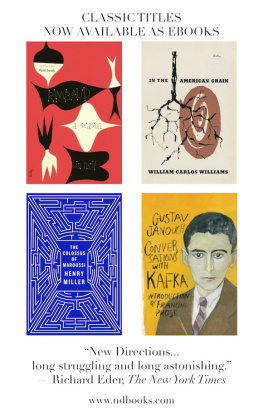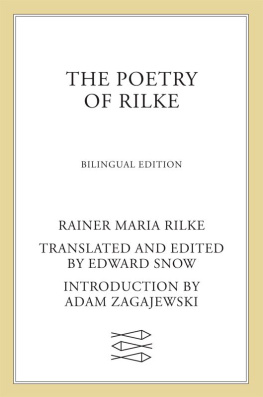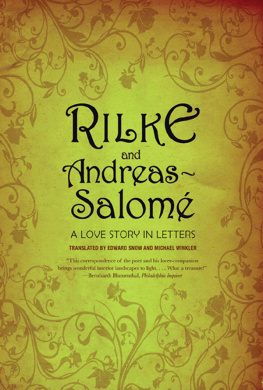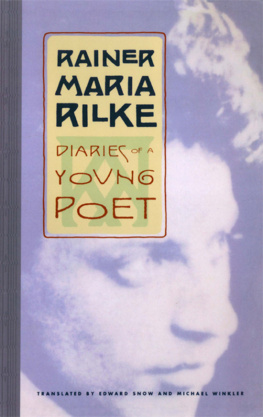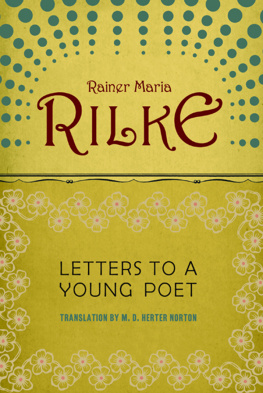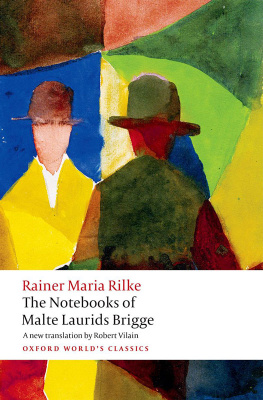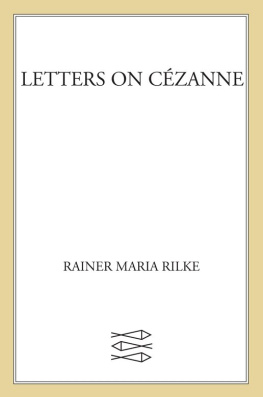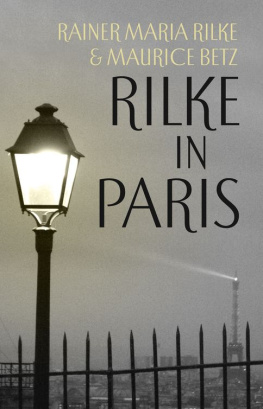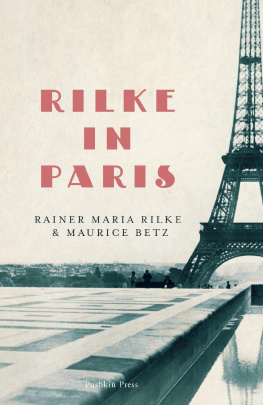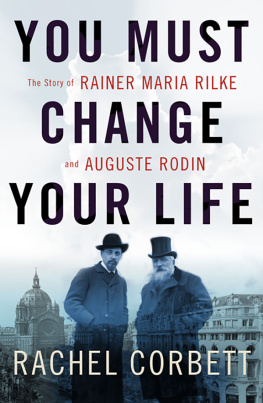FOREWORD
R ILKE has come through to English-speaking readers more deeply, though less widely, through his prose than his poetry. Prose can better be reconstituted in another tongue, for reasons obvious to anyone who comprehends the sonic integrity of poetry; and thus it is through his letters and essays that we whose German is inadequate to the complexities of his poetry can come closest to Rilke.
This volume presents some of his most important writing, including what is to me the very pinnacle among his prose works of his marvelous gift for imaging forth perceptions and recognitions that are basic to an understanding of art and of life: I mean the short, little-known piece called Concerning the Poet. In it the task of the poet, in society and within the individual, is defined in a figurative form that provides a lifetimes matter for thought and wonder.
The present collection gives one, too, the Rilke who could write with such penetration about visual art. Perhaps no one has ever seen Cezanne better than Rilke, and he was certainly one of the first to fully appreciate the nature and significance of his art and life. That vision is recorded in his letters to Clara from Paris, and among these essays there is no word of Cezanne; but The Rodin-Book , included here, dates from the years when Rilke was discovering Cezanne, and Van Gogh too, and demonstrates that his writing about sculpture and painting was notin that manner visual artists find so offensiveliterary in the sense of merely using the plastic as a springboard for verbal arabesques, but was always based, however intuitively and however articulately, in a pure, concentrated and respectful looking. He learned so much from visual artistsmore, as he clearly acknowledged, than from any fellow writers, past or contemporary with himself; and he repaid them, as it were, by giving back to them that close attention he felt he had received, through their works, from them. Its as if an artists vision of a subject is, if shared and absorbed, a vision of the beholders own soul or psyche, revealing not only the motif but ones own inner potential. And Rilke participates still further in this process: the images with which he describes specific sculptures of Rodins never seem to be applied from without, but instead to begin from a center within the stone, as if his in-seeing had indeed penetrated to the core of a block of marble and then moved outward into image as the sculptors own might do.
The earliest of these pieces is the prose-poem The Lay of Love and Death of Cornet Christoph Rilke, written at white heat on a single night in 1899. The latest is the very curious The Young Workmans Letter of 1922 (four years before the poets death). In this Letter Rilke does a strange thing: in the persona of a factory worker, he wrote to himself. The persona is a thin characterization, utterly unconvincing as a fictive entity; indeed, Rilke was at his weakest when he attempted fiction, as in the unpleasant and mawkish Stories of God, for instance. (Malte Laurids Brigge cant really be counted fiction, but rather as figurative autobiography.) But the Letter, despite the slight narcissism or immodesty of its implied self-image as the Wise Man to whom the young workman turns (as, after all, so many real people did turn, and received Rilkes generous and rich responses) is fascinating as a representation of Rilkes lifelong maintenance of a balance between his innate and intense religious emotion and his equally definite rejection of theological monopolies, especially of conventional Christianity. With his reverence for life, and admiration of the quality of reverence itself, he was the last person to have mocked the beliefs of others; but in the semi-persona of the young workman we see him posing to his poet-self the questions D. H. Lawrence, at much the same time, was also asking himself (and answering), concerning the dead hand of religion as it touches sex and sensuality and earth-loving joie de vivre.
The Letter is interesting, too, on another level, in including a sketch of Martha the waif, the young French working girl who loved Rilke and who flits from time to time through his letters to Princess Marie von Thurn und Taxis. In the short essay An Experience he describes certain epiphaniesfeeling the delicate vibrations of a tree as he leans against it; sensing a bird-call in a Capri garden as indivisible from his awareness of it; or the passion which [as a child] always seized him when it came to facing a storm, how, with his feelings in a tumult and striding over great plains, he broke through the wall of wind... swept blindly through dense distances.... And when he suggests that such moments of complete surrender would give food for thought in some immeasurable and unending way, he seems to express, unwittingly, the effect upon a readers life of a surrender to Rilke himself. To experience his writings is comparable to the experiencing of natural phenomena, for his high sophistication was, in an extraordinary degree, at the service of his intuitions, and he had the gift of sharing with his readers not the apparently unmediated illusion of a sight, and event, an emotion buta subtle differencethe experience of its apperception. Henry James had the same ability. A way to put it might be that Rilke, like James, does not so much make one feel one has witnessed some moment with ones own eyes as that one has looked at life for that instant with his eyes. Describing Martha listening to the peculiar calm of ancient churches and cathedrals, a silence brimful of ever recurring singing and these assaults of the organ, these onslaughts, these gales of song, every Sunday, these hurricanes on the great Feast Days, Rilke (in the guise of the young workman) says, she understood at once. Rilkes aesthetics were highly complex, his art is conscious; but one can say of him, as he says of Martha, that he was by nature wonderfully prepared. It is through the profoundly instinctive character of his intelligence that Rilke transforms and extends ones inner life.
DENISE LEVERTOV
Concerning Landscape
W E know so little about the painting of Antiquity; but it is safe to assume that it saw people as later painters have seen landscape. In the scenes of their vases, those unforgettable memorials of a great art of drawing, the surroundings (house or street) are only mentioned, as it were in abbreviated form, only indicated by their initial, but the naked human beings are everything, they are like trees bearing fruit and wreaths of fruit, and like shrubs in blossom, and like springs in which the birds are singing. In that age the body, which was cultivated like a piece of land, tended carefully like a harvest, and which one owned as one owns a valuable property, was the thing looked upon, was beauty, was the image through which all meanings passed in rhythmic movements, gods and animals, and all lifes senses. Man, although he had existed for thousands of years, was too new to himself, too delighted with himself, to look beyond or away from himself. The landscape was the road on which he walked, the course which he covered, it was all the places of sport and dance where the Grecian day was spent; the valleys in which the armies assembled, the harbours from which one set forth on adventure and to which one returned full of unheard-of memories and older; the days of festival and the garlanded silver-sounding nights which followed, the processions to the gods and the encircling of the altar: that was the landscape in which he lived. But the mountain, on which no gods in human likeness dwelt, was foreign, the foot-hills where no statue, visible from afar, was to be seen, the slopes untrodden by any shepherdthese were undeserving of mention. All was but a stage and empty so long as man did not appear to fill the scene with the cheerful or tragic action of his body. Everything awaited him and, when he came, everything withdrew to give him room.

